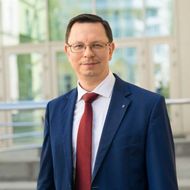The China Puzzle: Building Business with the Celestial Empire

Cooperation with Chinese partners in all spheres of the economy is reaching a new qualitative level. At the same time, Russian entrepreneurs often lack knowledge about the specifics of doing business with China. Ways to solve this problem and strengthen the bilateral partnership were discussed at the ‘Russia—China: Business in a Multipolar World’ forum held at HSE University.
The annual international forum ‘Russia—China: Business in a Multipolar World’ was held with the support of the Media-Communication Union as part of HSE University’s International Partners’ Week. At the forum, HSE University’s new Executive Master programme ‘Business with China: Organisational, Legal and Financial Support’ was presented, and a cooperation agreement with the Russian-Chinese B2B digital trade platform QIFA was signed.
Nikita Anisimov, HSE University Rector, addressed the audience with a welcoming speech. He wished constructive cooperation to the forum participants and expressed confidence that the opinions voiced would enrich the expertise of both countries and contribute to bringing bilateral economic cooperation to a new qualitative level.

Nikita Anisimov
HSE University Rector
‘Cooperation between Russia and China is a necessary element of the global turn to the East. As this cooperation develops, a large number of Russian entrepreneurs and managers will need to become more familiar with the ways of doing business in the Chinese business environment, taking into account administrative and legal factors. With that in mind, our university is launching a special master’s programme next month.’
First Deputy Chairman of the Federation Council Committee on International Affairs, former Ambassador Extraordinary and Plenipotentiary of the Russian Federation to the PRC (2013–2022) Andrey Denisov stressed the key role of Russia and China in building a multipolar world. ‘Polycentricity is in the interests of the global international majority. Today we have common tasks with our Chinese partners,’ he believes.
President of the Union of Chinese Entrepreneurs in Russia Zhou Liqun emphasised the importance of diplomatic relations between countries and their significant contribution to the development of a multipolar world. ‘Working with a Russian partner, we feel support at the highest level,’ he noted. According to him, economic cooperation between Russia and China is developing rapidly in all sectors of the economy: trade volume has grown by 32% this year.
In Russia, a huge amount of work is currently underway to build an effective partnership with Chinese colleagues, emphasised Dmitrii Kuznetsov, Director at the Higher School of Law and Administration, Tenured Professor at HSE University, and Chairperson of the Expert Council for the Development of Professional Qualifications at the State Duma Committee on Science and Higher Education.
The upheavals of recent years have presented an opportunity for relations between Russia and China, emphasised Victoria Panova, HSE University Vice Rector.
Cooperation is being established in various sectors of the economy. In addition to the growing trade in goods, trade in services is developing, and tourism is actively growing.
In addition, she spoke about university cooperation with Chinese colleagues. Currently, HSE University has built partnerships with 26 organisations in China. More than 200 Chinese citizens study at HSE University, and about 80 HSE University students are trained at universities in China. Also, 12 joint projects are being implemented as part of fundamental research at HSE University.

Victoria Panova
HSE University Vice Rector
‘Enormous opportunities are opening up now for expanding mutual trade and launching new investment and educational projects. The potential is significant—a lot can be done today.’
The PRC has been Russia’s largest trading partner since 2010, emphasised Sergey Lukonin, Head of the China Economics and Politics Sector at the Primakov Institute of World Economy and International Relations of the Russian Academy of Sciences (IMEMO RAS), and Chief Expert at HSE University’sHigher School of Law and Administration.

Sergey Lukonin
Chief Expert at HSE University’sHigher School of Law and Administration
‘Today, China is the largest supplier of technically complex equipment for Russia, one of the main consumers of Russian natural resources (including oil and gas), as well as agricultural products. In addition, China is a fairly large investor and participates in joint projects in the field of space exploration, aircraft manufacturing, defence, mining, processing and transportation of energy and other minerals, telecommunications, transport, etc.’
At the end of the plenary session, Natalya Pomozova, moderator and member of the Presidium of the Council on Foreign and Defence Policy, spoke about HSE University’s Executive Master programme ‘Business with China: Organisational, Legal and Financial Support’, of which she is Administrative Head. The training is practice-oriented in nature, involves the development of complex systemic competencies in management and contributes to achieving success in building business with Chinese partners.
Opportunities of International e-Commerce
The topic of entrepreneur training was continued at the ‘Russian and Chinese Business: Leadership in Digital World’ discussion panel moderated by Artem Semenov, Academic Supervisor of the ‘Business with China: Organisational, Legal and Financial Support’ programme, Advisor to the Governor of Moscow Region, and honorary citizen of Jiangsu Province (PRC).
Despite the obvious benefits, Russian entrepreneurs often do not have enough knowledge to cooperate with Chinese partners, said Anna Bessmertnaya, Chairperson of the Commission on Foreign Economic Cooperation with Chinese Partners of the Moscow Chamber of Commerce and Industry. Also, Russian business does not fully utilise the capabilities of Chinese electronic platforms. At the same time, the potential is enormous. In particular, Chinese consumers are interested in Russian cosmetics and food products.

Elena Anikeeva, Master of Chinese Business Law (University of International Business and Economics (UIBE), Beijing), lawyer of the Primorsky Regional Bar Association, emphasised the need to possess knowledge of the Chinese language for drawing up legal documents, in particular contracts and agreements between companies.
The speech by Sun Tianshu, President of HYLINK Supply Chain Management, an international Russian-Chinese holding company, was dedicated to digital trade. He said that both countries actively implement government strategies for the digital economy in the areas of finance and taxation, as well as customs. E-Commerce structures are intensively developing in these fields. ‘The digitalisation of Russian-Chinese trade will lead to an increase in bilateral trade turnover by USD 100 billion,’ Sun Tianshu calculated. He spoke about the QIFA Russian-Chinese B2B digital trade platform, of which he is the founder and chair of the board. A cooperation agreement with the platform was signed within the framework of the forum. The platform provides comprehensive e-commerce services, including cross-border transactions, procurement, marketing, cargo consolidation and distribution, and supply chain finance.
The speech by Vasily Lemutov, founder of the Asia Business Blog expert and analytical project, was devoted to the prospects for the development of the digital yuan and digital rouble, as well as cooperation between these two currencies.
In addition, the forum was attended by Mei Xiaying, Postdoctoral Professor at the Law Institute of the People’s University of China, Dean of the School of Law at the University of International Business and Economics (UIBE); Luo Ersi, General Representative of Sany in the CIS, and Zhao Di, General Director of OneMig International Logistics LLC.
See also:
HSE Expands Cooperation with Chinese Universities
An HSE delegation, led by Rector Nikita Anisimov, visited China for negotiations with the administration of the country’s top universities. The parties agreed to expand bilateral scientific and educational collaboration and signed several documents. In particular, a strategic partnership agreement was established with Peking University, one of the oldest and most prestigious educational institutions in China.
ICEF HSE Takes Part in Study Abroad Fair in China among World's Leading Universities
On March 18, 2025, the Southwestern University of Finance and Economics (SWUFE), Chengdu, China welcomed its counterparts to the SWUFE Study Abroad Fair. Russia was represented for the first time at the fair by a delegation from HSE University, including members of ICEF.
‘HSE’s Industry Ties Are Invaluable’
Pan Zhengwu has spent the last seven years at HSE University—first as a student of the Bachelor’s in Software Engineering and now in the Master’s in System and Software Engineering at the Faculty of Computer Science. In addition to his busy academic schedule, he works as a mobile software engineer at Yandex and is an avid urban photographer. In his interview with the HSE News Service, Zhengwu talks about the challenges he faced when he first moved to Russia, shares his thoughts on ‘collaborating’ with AI, and reveals one of his top spots for taking photos in Moscow.
‘Looking for Talents’: HSE University Holds Entry Competitions in Three Chinese Cities
In early March, representatives of HSE University-St Petersburg organised a series of entry competitions for applicants from China. The exams were held in three cities—Beijing, Nanjing and Chengdu—at the Russian Cultural Centre (RCC) in Beijing and leading Chinese universities.
‘I See a Great Need for Organisations That Support Russian and Chinese Businesses’
Anastas Karagadaev, a graduate of the master’s programme ‘Science, Technology and Innovation Management and Policy’ at the Institute for Statistical Studies and Economics of Knowledge (ISSEK) at HSE University, achieved significant career success even during his student years. Back then, he actively participated in the Laboratory for Science and Technology Studies at ISSEK and founded his own start-up. Currently, he is working on developing projectswithin the Russia–China Centre for Innovation Cooperation in Nanjing.
‘Here at ICEF, I Study and Communicate with Intelligent People’
Yan Minghao, from China, is in his second year of master’s study at ICEF HSE and has a passion for mathematics and Russian culture. In this interview, he shares the experience of being an ICEF student, contributing to international research venues, and travelling around Russia.
HSE ICEF and China’s SWUFE RIEM Launch Double Master’s Degree
In January 2025, HSE University entered into a cooperation agreement with the Southwestern University of Finance and Economics (SWUFE) to implement a double master’s that joins ICEF’s Financial Economics programme with SWUFE’s Master's in Finance. Combining the best of China and Russia’s academic frameworks, this new degree offers a unique study-abroad experience. In this collaboration, HSE ICEF is partnering with the Research Institute of Economics and Management (RIEM), which was established at SWUFE in 2006 to facilitate top-level, international research and training in economics and finance.
‘My PhD Journey Was Made Possible by My Studies at HSE’
Tianxiong Yu, 25, completed his Master’s in Economics and Economic Policy at HSE University in Moscow. He spent the second year of the programme at the University of Luxembourg and has since enrolled there on a doctoral programme. While it is no longer a joint programme, HSE graduates continue to successfully pursue PhDs at international universities. Tianxiong spoke to the HSE News Service about his memories of his master’s course and how his time at HSE paved the way for his doctoral research.
HSE Strengthens International Ties: Meetings with University Delegations from China and Kyrgyzstan
On January 24, 2025, at the HSE University campus on Pokrovka, Rector Nikita Anisimov and representatives from key departments and internationalisation subdivisions met with delegations from South China Normal University and Kyrgyz National University named after Jusup Balasagyn. The discussions focused on opportunities for expanding cooperation in various fields.
‘Education and International Work Experience Are Key Factors for Innovation in Developing Economies’
On December 20, the Faculty of Economic Sciences hosted the Third Sino-Russian Workshop on Innovations and Innovativeness, organised in collaboration with the School of Economics at Shanghai University. Three representatives from each institution, including staff and PhD students, presented at the seminar. The participants discussed factors influencing company innovativeness, the role of leaders in R&D investments, and the impact of digital transformation.


